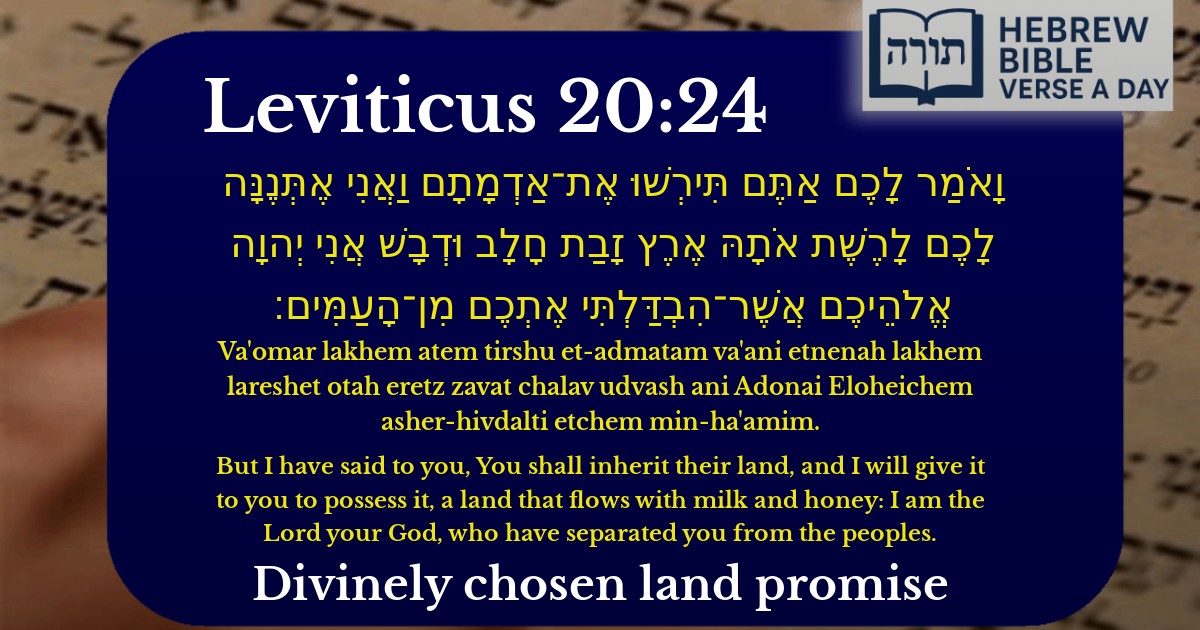Join Our Newsletter To Be Informed When New Videos Are Posted
Join the thousands of fellow Studends who rely on our videos to learn how to read the bible in Hebrew for free!
Hebrew Text
וָאֹמַר לָכֶם אַתֶּם תִּירְשׁוּ אֶת־אַדְמָתָם וַאֲנִי אֶתְּנֶנָּה לָכֶם לָרֶשֶׁת אֹתָהּ אֶרֶץ זָבַת חָלָב וּדְבָשׁ אֲנִי יְהוָה אֱלֹהֵיכֶם אֲשֶׁר־הִבְדַּלְתִּי אֶתְכֶם מִן־הָעַמִּים׃
English Translation
But I have said to you, You shall inherit their land, and I will give it to you to possess it, a land that flows with milk and honey: I am the Lord your God, who have separated you from the peoples.
Transliteration
Va'omar lakhem atem tirshu et-admatam va'ani etnenah lakhem lareshet otah eretz zavat chalav udvash ani Adonai Eloheichem asher-hivdalti etchem min-ha'amim.
Hebrew Leining Text
וָאֹמַ֣ר לָכֶ֗ם אַתֶּם֮ תִּֽירְשׁ֣וּ אֶת־אַדְמָתָם֒ וַאֲנִ֞י אֶתְּנֶ֤נָּה לָכֶם֙ לָרֶ֣שֶׁת אֹתָ֔הּ אֶ֛רֶץ זָבַ֥ת חָלָ֖ב וּדְבָ֑שׁ אֲנִי֙ יְהֹוָ֣ה אֱלֹֽהֵיכֶ֔ם אֲשֶׁר־הִבְדַּ֥לְתִּי אֶתְכֶ֖ם מִן־הָֽעַמִּֽים׃
וָאֹמַ֣ר לָכֶ֗ם אַתֶּם֮ תִּֽירְשׁ֣וּ אֶת־אַדְמָתָם֒ וַאֲנִ֞י אֶתְּנֶ֤נָּה לָכֶם֙ לָרֶ֣שֶׁת אֹתָ֔הּ אֶ֛רֶץ זָבַ֥ת חָלָ֖ב וּדְבָ֑שׁ אֲנִי֙ יְהֹוָ֣ה אֱלֹֽהֵיכֶ֔ם אֲשֶׁר־הִבְדַּ֥לְתִּי אֶתְכֶ֖ם מִן־הָֽעַמִּֽים׃
🎵 Listen to leining
Parasha Commentary
📚 Talmud Citations
This verse is quoted in the Talmud.
📖 Ketubot 111a
The verse is referenced in the context of discussing the virtues of the Land of Israel and God's promise to the Jewish people.
📖 Sotah 11b
The verse is cited in relation to the divine promise of the Land of Israel to the Israelites, emphasizing its fertility and holiness.


Context and Overview
The verse appears in Vayikra (Leviticus) 20:24, where Hashem reassures Bnei Yisrael of their inheritance of Eretz Yisrael—a land flowing with milk and honey—and emphasizes their unique sanctity as a nation set apart from other peoples. This promise is part of a broader exhortation to uphold kedushah (holiness) by observing mitzvot.
Inheritance of the Land
Rashi explains that the phrase "You shall inherit their land" refers to the expulsion of the Canaanite nations, whose moral corruption (as detailed earlier in the parashah) disqualified them from retaining the land. The land itself is intrinsically holy, as Ramban (Nachmanides) notes, and thus requires a nation living by Hashem’s laws to merit dwelling there. The promise is conditional on Bnei Yisrael’s adherence to Torah.
"A Land Flowing with Milk and Honey"
The description of Eretz Yisrael as "flowing with milk and honey" is interpreted both literally and metaphorically:
Separation from the Nations
Hashem declares, "I have separated you from the peoples," underscoring the unique role of Bnei Yisrael. The Rambam (Hilchot Avodat Kochavim 11:1) explains this as a call to avoid assimilation into foreign cultures and their idolatrous practices. The Sforno adds that this separation enables the Jewish people to serve as a "kingdom of priests" (Shemot 19:6), modeling divine ethics to humanity.
The Divine Guarantee
The verse concludes with "I am the Lord your God," affirming that the covenant and land-gift are rooted in Hashem’s eternal authority. As the Netziv (Ha'amek Davar) emphasizes, this declaration reinforces that the bond between Hashem and Klal Yisrael is unchanging, even when challenges arise in inheriting or retaining the land.